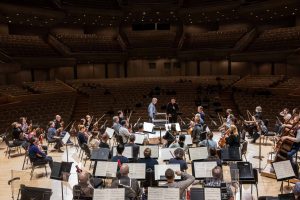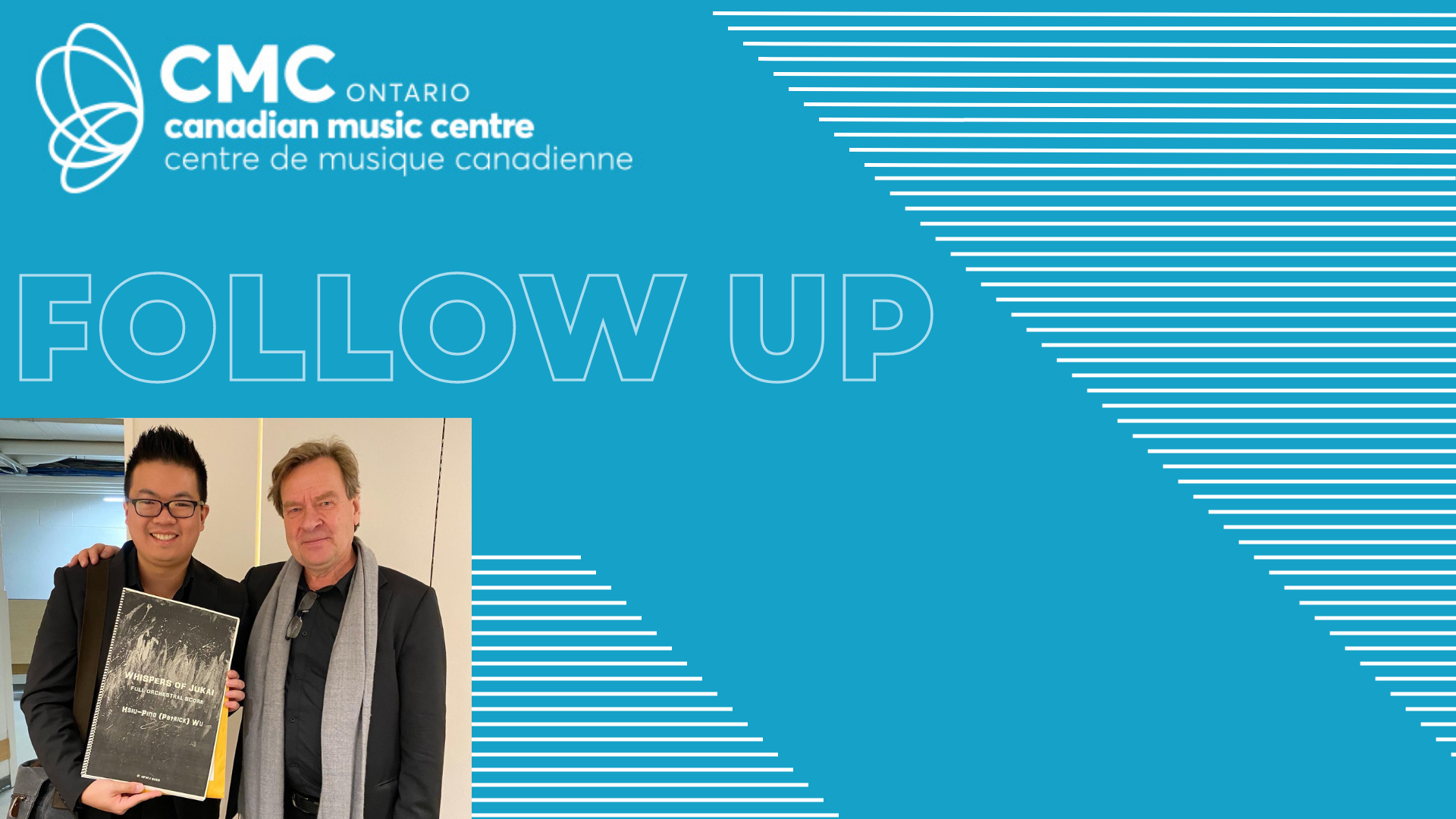CMC Ontario Regional Director Joseph Glaser sat down with Hsiu-Ping Wu, a participant in the latest edition of the Toronto Symphony Orchestra’s Explore the Score program to discuss his participation in the reading session.
Since 2012, the TSO has given some of Canada’s top emerging composers an opportunity to hear their works rehearsed in a live professional orchestral setting. Presented in collaboration with the Canadian Music Centre (CMC), Explore the Score is part of an ongoing commitment to support the development of emerging Canadian composers and the creation of new orchestral works, and to offer the public a front-row seat in witnessing artistic creation first-hand. The program provides some of Canada’s promising composers an opportunity to hear their work performed in a professional orchestral setting and receive mentorship from artistic and administrative staff. The 2022 edition involved advising sessions from the TSO’s orchestral librarian Christopher Reiche-Boucher, RBC affiliate composer Alison Yun-Fei Jiang, TSO’s composer advisor Gary Kulesha, TSO’s music director Gustavo Gimeno, and guest composer Magnus Lindberg.
On October 22nd, the Toronto Symphony Orchestra read Patrick’s work Whispers of Jukai alongside works by Coreen Morsink, David Occhipinti, and Véronique Noël conducted by Gary Kulesha.
Joseph Glaser: Tell me a little bit about your background, how did you get into music?
Hsiu-Ping (Patrick) Wu: I am a Taiwanese Canadian and I was born in Taiwan. I started learning piano when I was 6 or 7 and I picked up the violin when I moved to Canada, at around 15 years old. I went to King’s-Edgehill School, a boarding school in Nova Scotia. There I found my passion for music by being in pop cover bands. Eventually I realized that I needed to deepen my study of music and needed more of a classical foundation. Because of this I went to Dalhousie University in Music and found my passion for composition in an introduction to composition course. From there I became increasingly interested in composition, eventually getting my Master’s with double majors in violin performance and composition at Longy School of Music in Cambridge, Massachusetts. So, violin and composition have been companion passions of mine throughout the years.
JG: Now that you’re splitting your time between Halifax and Boston, what is your impression of the scenes in the two countries/cities?
HPW: Halifax and Boston are actually not too far apart. Before Covid, the flights only took 40 minutes to get from one city to the other. The music scene, however, is very different. The scene in Boston is much bigger and more diverse. I love the Halifax scene, it’s small enough that everyone knows each other, it’s a very tight-knit community so a little easier to get your name out. Compared to Boston, Halifax is a well-established music scene but it’s continuing to grow at a rapid speed!
JG: Can you tell me a bit about the piece and what you were going for, and did you achieve those goals?
HPW: Whispers of Jukai is based on a combination of forests I’ve been to in Taiwan. The word jukai is actually Japanese and it directly translates as “sea/ocean of trees.” That term really resonated with me, so it became the inspiration and title for the piece. A couple of years back, I was on a hike through a forest in Taiwan where the trees had all died because of an earthquake and they were all dried up. I noticed that even though this patch of forest was dead and barren, there was life forming all around. That got me thinking about how life blooms out of death and the cycle of life. With this piece, I chose to layer my melodies just like how trees form on top of each other. The melodies layer into waves and waves coming and going just like the lifecycle of the trees. I first started writing the piece in 2018, and it’s gone through a couple of workshops, winning a competition at my school in 2020 – which was then cancelled. With all of this, it’s still never been officially performed, just been through workshops. However, prepping for the TSO reading really helped me solidify all aspects of the composition. For example, my notation and making it more musical, checking balance on orchestration and instrumentation, and making the most out of my materials. I’m very grateful to be able to achieve those goals in such a short time during the reading.
JG: You talk a bit about your music bridging your multicultural identity. How does this make its way into your music, and is it in this piece as well?
HPW: Not so much with this particular piece. This piece represents more a situation where my older self is reconnecting with my younger self in terms of musical style. This engagement with my identity is something that I’ve only started doing recently. I find that Canadian Music history and Taiwanese Music history are quite similar in that both countries have large indigenous populations, the classical music is influenced by Dutch, Portuguese, Chinese, and Japanese colonial regimes, this gives Taiwan’s musical culture the feeling of a kaleidoscope, something I also find in Canada. I am interested in exploring these similarities more, including in my Master’s thesis I am currently working on. In a few of my pieces I’ve put in Nova Scotian folk music influences and more recently Taiwanese folk songs and traditions as well. I recently wrote a piece that uses twelve-tone music and music influenced by the New York School [I.e. John Cage, Morton Feldman, Earle Brown] mixed with Taiwanese folk songs to create a feeling of nostalgia. I found that combination to be quite effective.

JG: Could you describe the reading session from your perspective?
HPW: I think everything was done very efficiently and effectively. The library session was very clear. I actually was not expecting as much feedback as I got in both the reading and the library session. It was definitely one of the most rewarding reading sessions I’ve ever taken part in. Usually, you are left to prep your piece on your own, then you go in and talk to the orchestra without a moderator, which can be intimidating. With the TSO I felt like I was in good hands the whole way through. I learned so much from seeing the rehearsal process. To have an orchestra that is able to respond instantly to adjustments in balance and really get what you’re trying to go for is really very rewarding.
JG: Do you have any takeaways from the experience?
HPW: Spend time making the score as clear as possible. When you think it’s clear enough make it clearer. My piece was also less difficult than other pieces in the session and that prompted me to think about going further with my language and push myself sonically. Lastly, I was really blown away by all the feedback, especially from Magnus Lindberg as a guest composer at the session. I am very glad that he was very willing to work with everyone there.
A big thank you to everyone who made this reading session happen!

